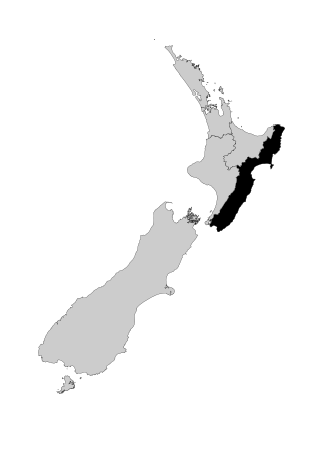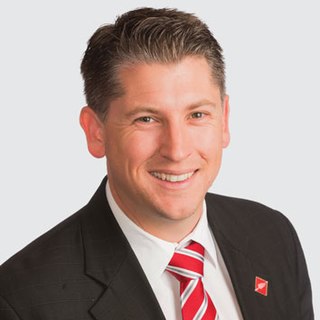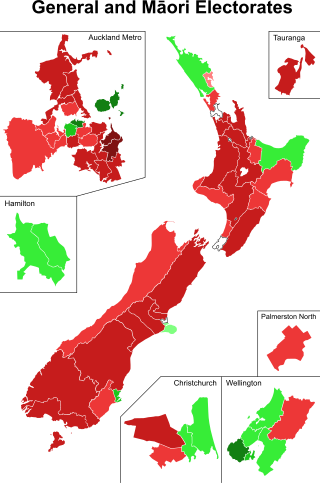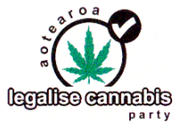The Green Party of Aotearoa New Zealand, commonly known as Green or the Greens, is a green and left-wing political party in New Zealand. Like many green parties around the world, it has four pillars. The party's ideology combines environmentalism with left-wing and social-democratic economic policies, including well-funded and locally controlled public services within the confines of a steady-state economy. Internationally, it is affiliated with the Global Greens.

Nándor Steven Tánczos is a New Zealand social ecologist, researcher, educator, activist and political commentator. He is currently a councillor in the Whakatāne District Council. He is also co-director of He Puna Manawa social and political change agency.

Metiria Leanne Agnes Stanton Turei is a New Zealand academic and former politician. She was a Member of Parliament from 2002 to 2017 and the female co-leader of the Green Party of Aotearoa New Zealand from 2009 to 2017. Turei resigned from the co-leader position on 9 August 2017 amid a political controversy arising from her admission to lying to the Ministry of Social Development to receive higher payments when she was on the Domestic Purposes Benefit and later, to being enrolled to vote in an electorate where she was not eligible when she was 23.

Michael George Appleby is a politician, cannabis activist, and lawyer based in Wellington, New Zealand.

Mana is a New Zealand parliamentary electorate in the Wellington metropolitan area. It has been held by Barbara Edmonds of the Labour Party since the 2020 election.

Ikaroa-Rāwhiti is a New Zealand parliamentary Māori electorate that was formed for the 1999 election. It covers the eastern North Island from East Cape south through Hawke's Bay and the Wairarapa to Wainuiomata and most of the Hutt Valley, but not southern Lower Hutt or Wellington City.

The use of cannabis in New Zealand is regulated by the Misuse of Drugs Act 1975, which makes unauthorised possession of any amount of cannabis a crime. Cannabis is the fourth-most widely used recreational drug in New Zealand, after caffeine, alcohol and tobacco, and the most widely used illicit drug. In 2001 a household survey revealed that 13.4% of New Zealanders aged 15–64 used cannabis. This ranked as the ninth-highest cannabis consumption level in the world.

The 2009 Mount Albert by-election was held in the New Zealand electorate of Mount Albert on 13 June 2009. There were fifteen candidates in the election. David Shearer of the Labour Party won the election with 63% of the vote. The seat was vacated by former Labour Prime Minister Helen Clark, who resigned from the New Zealand Parliament on 17 April 2009 following her appointment to head the United Nations Development Programme. Main issues surrounding the campaign included the building of the Waterview Connection and the Auckland Region becoming a supercity.

Cannabis political parties are generally single-issue parties that exist to oppose the laws against cannabis.

David James Clendon is a New Zealand former politician. He was a list Member of Parliament in the New Zealand House of Representatives for the Green Party of Aotearoa New Zealand from 2009 until 2017. He later served one term on the Far North District Council from 2019 to 2022.
Dakta Green, formerly Kenneth Morgan is a former New Zealand cannabis law reform activist and political candidate. He changed his name by public poll in 2008. He is the Activism co-ordinator for NORML New Zealand, the driver of Mary Jane the Cannabus, and founder of The Daktory. He was a candidate for the Aotearoa Legalise Cannabis Party in the 2009 Mount Albert by-election.

A by-election was held in the New Zealand electorate of Ikaroa-Rāwhiti on 29 June 2013. The seat was vacated by the death of incumbent member of parliament Parekura Horomia two months earlier, who had represented the electorate for the Labour Party since its inception for the 1999 election. The election was won by Labour's Meka Whaitiri.

Whakamana Cannabis Museum is New Zealand's first museum dedicated to the history of cannabis use and culture. It was first opened in October 2013 in Dunedin as part of a project spearheaded by Abe Gray, former deputy leader of the Aotearoa Legalise Cannabis Party (ALCP), and Julian Crawford, former ALCP regional spokesperson.

A by-election was held in the Mount Roskill electorate on 3 December 2016. The seat was vacated following the resignation of Phil Goff after he was elected Mayor of Auckland.

The 2017 New Zealand general election was held on Saturday, 23 September 2017, to determine the membership of the 52nd New Zealand Parliament. Parliament has 120 seats, and 71 were filled by electorate MPs, with the remaining 49 from ranked party lists. Writ day, i.e. the day when the Governor-General issues a formal direction to the Electoral Commission to hold the election, was set for Wednesday, 23 August 2017. As stipulated in section 127 of the Electoral Act 1993, the writ will set a date by which registered parties must submit a "list of candidates for election to the seats reserved for those members of Parliament elected from lists". Party lists must have been submitted by Monday, 28 August, at noon. On Wednesday, 30 August, the Electoral Commission released details of candidates for election, party lists, and the polling places. This page lists candidates by party, including their ranking on a list.

Jo-Anne Marie Luxton is a New Zealand politician. She has been a Member of Parliament in the House of Representatives for the Labour Party since the 2017 general election.

The 2020 New Zealand cannabis referendum was a non-binding referendum held on 17 October 2020 in conjunction with the 2020 general election and a euthanasia referendum, on the question of whether to legalise the sale, use, possession and production of recreational cannabis. It was rejected by New Zealand voters. The form of the referendum was a vote for or against the proposed "Cannabis Legalisation and Control Bill". Official results were released by the Electoral Commission on 6 November 2020 with 50.7% of voters opposing the legalisation and 48.4% in support.
Christopher John Baillie is a New Zealand politician. He was a Member of Parliament for ACT New Zealand from 2020 to 2023.

Abraham Gabriel Gray is an American-born New Zealand cannabis activist, politician and founder of the Whakamana Cannabis Museum, New Zealand's first and only cannabis museum. Gray was a University of Otago lecturer and tutor for over a decade before founding the museum.

The 2023 New Zealand general election was held on Saturday, 14 October 2023 to determine the membership of the 54th New Zealand Parliament. This page lists candidates by party, including their ranking on a list. Full official lists were published on 16 September.
















